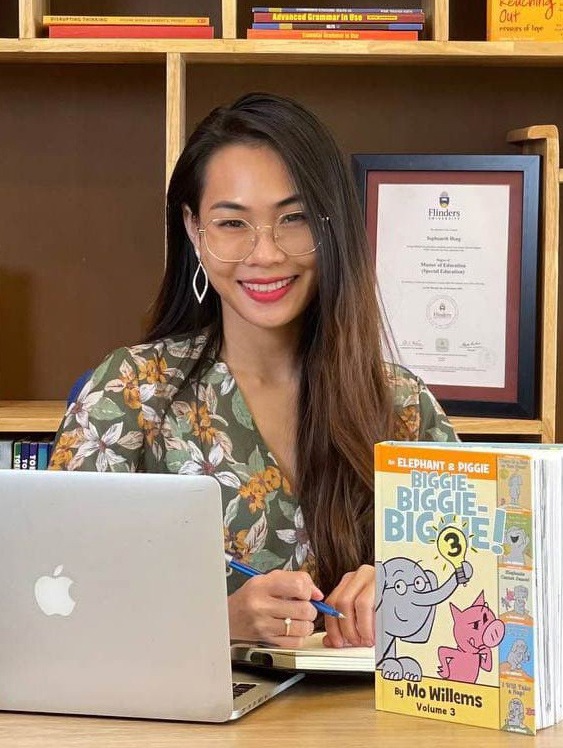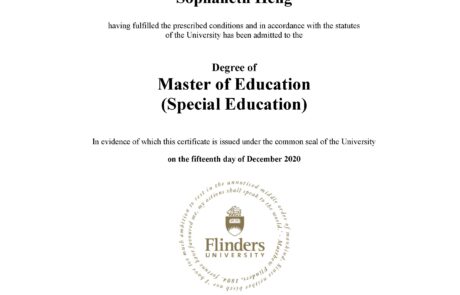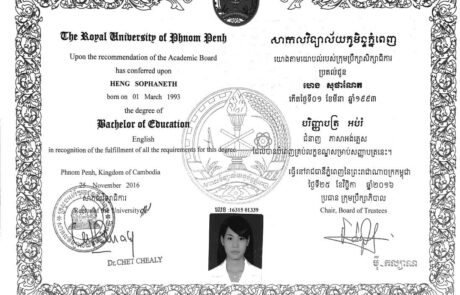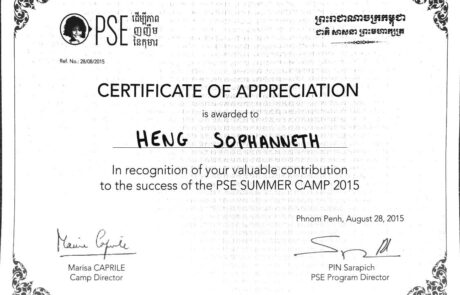Special Educational Needs Teacher
Special Educational Needs Teacher

Sophaneth Heng Special Educational Needs Teacher
Currently, I am a Special educational needs/ (SEN) teacher with a master’s degree in Special Education awarded by Flinders University, Australia. Prior to this, I had worked with special needs students at Pour un Sourire d’Enfant (PSE) and the International School of Phnom Penh (ISPP). This working experience inspires me to pursue Special Education as my career.
Formal/Higher Education backgrounds:
1.Bachelor Degree of Education (TEFL)- Institution of Foreign Languages
2.Master Degree of Education ( Special Education) – Flinders University
Webinars/Seminars Attended Courses:
1.The ABCs of Applied Behaviour Analysis (ABA)- R.E.A.C.H, Inc
2.Autism Focused Intervention-National Professional Development Center (AFIRM)
3.Multifactored Psychoeducational Assessement- R.E.A.C.H, Inc
4.Effective Sensory Diets for Children with Autism, ADHD, LD & Sensory Modulation Disorder- R.E.A.C.H, Inc
5.Developing a Behaviour Intervention Plan- R.E.A.C.H, Inc
6.Positive Reinforcement Planning and Implementation-National Professional Development Center (AFIRM)
Sophaneth Heng Special Educational Needs Teacher
Currently, I am a Special educational needs/ (SEN) teacher with a master’s degree in Special Education awarded by Flinders University, Australia. Prior to this, I had worked with special needs students at Pour un Sourire d’Enfant (PSE) and the International School of Phnom Penh (ISPP). This working experience inspires me to pursue Special Education as my career.
Formal/Higher Education backgrounds:
1.Bachelor Degree of Education (TEFL)- Institution of Foreign Languages
2.Master Degree of Education ( Special Education) – Flinders University
Webinars/Seminars Attended Courses:
1.The ABCs of Applied Behaviour Analysis (ABA)- R.E.A.C.H, Inc
2.Autism Focused Intervention-National Professional Development Center (AFIRM)
3.Multifactored Psychoeducational Assessement- R.E.A.C.H, Inc
4.Effective Sensory Diets for Children with Autism, ADHD, LD & Sensory Modulation Disorder- R.E.A.C.H, Inc
5.Developing a Behaviour Intervention Plan- R.E.A.C.H, Inc
6.Positive Reinforcement Planning and Implementation-National Professional Development Center (AFIRM)

Sophaneth Heng
Special Educational Needs Teacher
Currently, I am a Special educational needs/ (SEN) teacher with a master’s degree in Special Education awarded by Flinders University, Australia. Prior to this, I had worked with special needs students at Pour un Sourire d’Enfant (PSE) and the International School of Phnom Penh (ISPP). This working experience inspires me to pursue Special Education as my career.
Formal/Higher Education backgrounds:
1.Bachelor Degree of Education (TEFL)- Institution of Foreign Languages
2.Master Degree of Education ( Special Education) – Flinders University
FAQ



